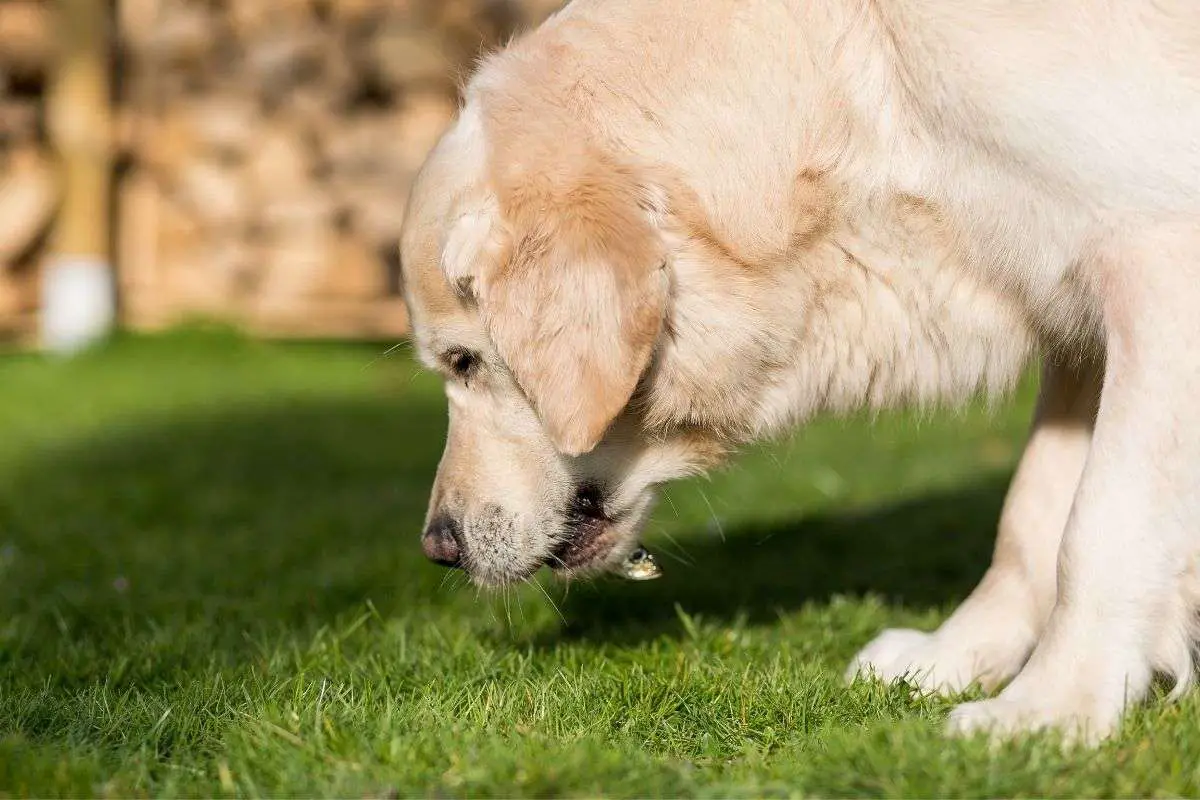There’s nothing worse than knowing that your dog is feeling sick, and you don’t know what you can do to help. Worse than that, you might not even know why they are throwing up, and it can be a very scary experience. However, there is always something we can do to help. If your dog is throwing up yellow, and you need to find out more about it, read through this particle. Here, we will cover why your dog’s vomit might be yellow, if you should be worried, and finding the cause. Hopefully this helps ease your mind a little, and you feel confident to know what you need to do next to help your pet!

Table of Contents
- Why Is The Vomit Yellow?
- Treatments For Throwing Up Bile
- Preventing Your Dog From Throwing Up Yellow
- Preventing Dogs From Throwing Up Yellow
- FAQs
Why Is The Vomit Yellow?
If your dog is throwing up yellow, they are probably vomiting bile.
Bile is the digestive fluid that can get backed up into the stomach nu the gallbladder.
This is an alkaline liquid and has a strong smell, and can be foamy or liquid when it is thrown up. There could be a number of reasons why your dog is throwing up bile, and we will explore them below.
Finding Out The Cause
Since there could be a number of things that have caused your dog to throw up bile, we will explore each of them. Hopefully this will give you a good idea of what the problem could be, and give you an idea of how to prevent it in the future.
There are some common things that could be causing your dog to throw up bile, as well as some more serious health issues. Chances are, however, that your dog is throwing up bile because of something that is relatively straightforward, so don’t start to worry if you don’t need to!

Common Causes Of Dogs Throwing Up Bile
Food Allergies
Just like in people, food allergies are pretty common in dogs. You need to be aware of what your dog is eating, and when you introduce new things into their diet.
If you have started feeding them something new, and they begin to vomit, see what the ingredients are and see if you can figure out what exactly is causing the reaction.
Animals can also develop sudden allergies, so if you have recently moved to a new house, or any other stressful event has happened, there is a small chance that an allergy may have developed.
Below is a list of summon food allergies in dogs. If any of these ingredients are present in your dog’s food, try filtering them out so see which one is the culprit.
- Beef
- Corn
- Dairy
- Eggs
- Fish
- Lamb
- Pork
- Rabbit
- Soy
- Wheat
Heatstroke or Car Sickness
If your dog experiences excessive heat along with dehydration, they can experience heat stroke.
As you should know, it is never acceptable to leave your dog in the car alone, especially on hot days with no fresh air, food, or water.
They can experience similar reactions to travelling in cars, and motion sickness can be a problem that many owners have to deal with.
Although most dogs grow out of car sickness as they get older, some animals may need motion sickness treatment. It is important to never drive your dog around when they have an empty stomach, or else it could make the symptoms worse.
Eating Grass
Your dog eating grass is likely to result in some disgusting yellow vomit later in the day.
Although frequently eating grass can be a sign that your pet is not getting the nutrients they need from their food, it could also simply mean they are curious about the world.
Don’t let your dog eat grass when you are out for a walk, unless you want to deal with the consequences.
Empty Stomach
Not eating for extended periods of time can also result in your dog throwing up bile. The bile will irritate your dog’s stomach lining, which can in turn induce the vomiting.
Although this is pretty rare, it can happen with some dogs, so always make sure that your dog eats their food.

More Serious Health Problems
Gastrointestinal Problems
If your dog seems to be throwing up a lot, they could be experiencing gastrointestinal problems.
These issues can include stomach ulcers, intestinal parasites, liver disease, some GI cancers, or inflammatory bowel disease (IDB).
Please note that these issues are relatively rare, so don’t be alarmed. If your dog begins to experience either symptoms, then you should make an appointment with your vet to get them checked out.
Other symptoms to look out for include:
- Abrupt changes in your dog’s behavior
- Dehydration
- Depression
- Diarrhea (possibly bloody)
- Lethargy
- Loss of appetite
- Vomiting blood
- Weight loss
- Yellowing of the skin, gums, or eyes
Intestinal Blockage
There is a small chance that your dog could be suffering from an intestinal blockage, or a blacked intestine. This could happen if your dog has eaten something they are not supposed to.
Your dog could have Pica, a condition where they crave items that should not be eaten (such as non-food items, your underwear, rocks etc.). If this is the case, your dog might need surgery to get the blockage removed.
Pancreatitis
If your dog has eaten too much food with a lot of oil or fat, their pancreas could become inflamed. This inflammation of the pancreas can often lead to throwing up bile.
If you are worried that this could be the reason for your dog’s recent vomiting, check if you can see signs of abdominal pain and diarrhea, as they are common symptoms. These symptoms are likely to occur between 1-5 days after your dog ate the food.

Treatments For Throwing Up Bile
There are a couple of things you can do to help your dog when they are throwing up yellow. These treatments are all natural and easy to do, but you need to keep an eye on your pet.
If the symptoms are not alleviated timeously or other worrying symptoms (like the ones mentioned above) begin to occur, organize a visit to your vet as soon as you can.
Monitor Their Diet
Keep an eye on what you feed your dog and what they can get hold of in the house. Test out new foods slowly to test if your dog is allergic to any of them before going all in. Track what your pet eats, and keep any unsafe foods and objects away from them.
Frequent, Small Meals
An easy solution to your dog’s problems is to feed them small, but frequent meals. Doing this will make sure that their stomach does not become empty, which will, in turn, prevent the inflammatory toxins from building up.
Make sure that you don’t end up feeding your dog more, but instead split up meals.
For example, if you would typically give your dog two cups of kibble a day, instead of giving them one cup in the morning and one in the evening, give them half a cup four times a day throughout the day.
Lots of Water
Since vomiting can cause dehydration in no time, make sure that your dog is drinking plenty of water. Maybe even entice them with coconut water.
Make sure there is water for them to drink at all times. If your animal is suffering from chromic vomiting, you might have to get them a fluid treatment at the vet.
Give Them Food that is Easy to Digest
If your dog is vomiting already, feed them food that is simple and easy to digest. A great meal to give them is skinless boiled chicken. Anything that is gentle on your dog’s stomach will do a world of good.
Remember to never add seasoning of any kind to your dog’s food. Unlike humans, dogs do not need the added salts and sugars, and they can do more harm than good.
Preventing Your Dog From Throwing Up Yellow
Prevention is always better than cure, so if you can prevent your dog from vomiting in the first place, it’s a win.
Make sure that your dog is living a healthy and balanced life. They need food with the right nutrients in, as well as frequent exercise.
If you are worried about anything in your dog’s diet, and think they may not be getting everything they need, consider getting them the vitamins they need in the form is supplements.
You can make homemade food for your dog, too. Homemade food can ensure that your dog is getting everything they need, and you can control what actually goes into it.
There are loads of great recipes you can try out online, so what’s stopping you?
Preventing Dogs From Throwing Up Yellow
Now that you know what could be causing your dog to throw up yellow, or bile, hopefully you feel better equipped to handle the situation.
Remember, the chances that it is anything serious is slim, so there’s no point in worrying until you have reason to. If your dog is vomiting up bile, simply follow the steps mentioned above, and see it if it helps them.
If, at any point, the symptoms get worse, or you begin to notice other worrying behaviors, then take them to the vet. More often than not, when your dog if throwing up bile, it can easily be treated at home.
FAQs
If your dog vomits yellow bile once in a while and seems otherwise healthy, you can try feeding smaller, more frequent meals to prevent an empty stomach. However, if the vomiting is frequent, accompanied by other symptoms, or you’re concerned about your dog’s well-being, it’s best to consult with a veterinarian.
Take note of how often your dog has been vomiting and if there are any other accompanying symptoms, such as lethargy, diarrhea, or changes in behavior. If your dog is vomiting yellow bile frequently, if the vomiting is accompanied by other concerning symptoms, or if you’re unsure about the cause, it’s a good idea to consult with your veterinarian.




